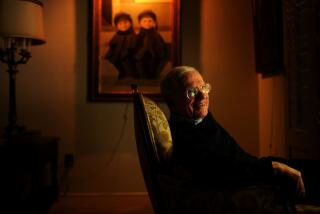COMMITMENTS : Will Today’s Real Heroes Please Stand Up? : Society: Traditionally, we look up to those people in the spotlight--politics, sports, film. But we may be confusing role models with celebrities.
- Share via
“My hero is Shaquille O’Neal,” says third-grader Luis Wentworth, 9. “He’sbig. He’s strong.”
“My hero is my mom,” says classmate Katrina Wiggins, 8. “She raised me good, and when I grow up, I want to raise my children the same way.”
Right through early adulthood, most of us say our heroes are our parents, or another family member. At age 30, we look at the bigger world and choose heroes from sports, theater, politics, says Jack Christe, director of the leadership study program at Ripon College in Wisconsin.
And that’s where it gets sticky.
Those heroes are under attack. We see all too much of our politicians’ foibles. The movie “Cobb,” with Tommy Lee Jones, shows perhaps baseball’s greatest player as the abusive tyrant and racist he really was.
And have we all OD’d on O.J.? Was he a greater football player than he was a hero? Somewhere along the line, we confused celebrity with hero. Now we’re finding that they’re not the same thing.
“Over time, what you see is the professionalization of the celebrity business,” says Irving Rein, professor of communications studies at Northwestern University in Evanston, Ill. “Making someone well-known is now a professional business. . . . People begin to know the celebrity better than they know their own family.”
How did we get here?
To get an answer, it’s necessary to do a brief history of heroes.
“If you go back to the ancient Greeks, a hero was a composite ideal,” says Robert J. Higgs, retired professor at Eastern Tennessee State University and author of two books on heroism. “A hero had to be a maker of speeches and a doer of deeds. When you look in the ancient world--say, the Bible--you see the idea of wholeness. David, for example, was a warrior and a shepherd.”
And David, had he been dogged by today’s media, would have been revealed as the husband-killer that he was. When he saw the beautiful Bathsheba bathing on a rooftop, he arranged to have her husband shipped off to battle, where he was killed. That’s the stuff of talk shows.
“A Power Ranger,” says third-grader Miguel Cuevas, 9. “The white one. He does special moves.”
“The green Power Ranger,” says classmate Jack Santiago, 8, “because green is my favorite color.”
“A hero in its simplest form was somebody who had done something of magnitude,” Rein says. “With the rise of distribution channels, we created a new class of hero that wasn’t really a hero, but was just somebody who had fame.”
“A hero invests extraordinary effort in achieving a goal on behalf of other people,” Christe says. “In the traditional way of thinking about a hero, a hero was somebody who’d saved somebody’s life. A celebrity is someone everybody knows about.”
Like, say, Zsa Zsa Gabor.
“She shows up in all the gossip columns,” Christe says. “People act like she matters.”
So maybe we should abandon the idea of heroes altogether? Just admit that everyone has faults and no one is deserving of the kind of worship we give the Big Names?
“Society does need models,” Rein says. “A lot of these people serve as models. It’s a natural process to look at people who have achieved and to take from them certain qualities.”
“My mother,” says Bianca Rochester, 8. “If someone tries to bother me, she would do something about it. She wouldn’t leave me home by myself.”
More to Read
Sign up for Essential California
The most important California stories and recommendations in your inbox every morning.
You may occasionally receive promotional content from the Los Angeles Times.













